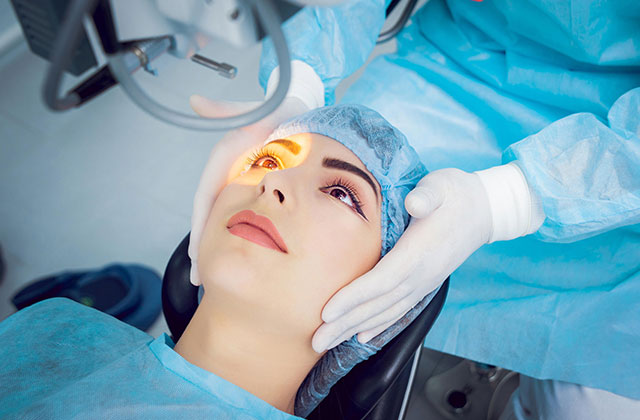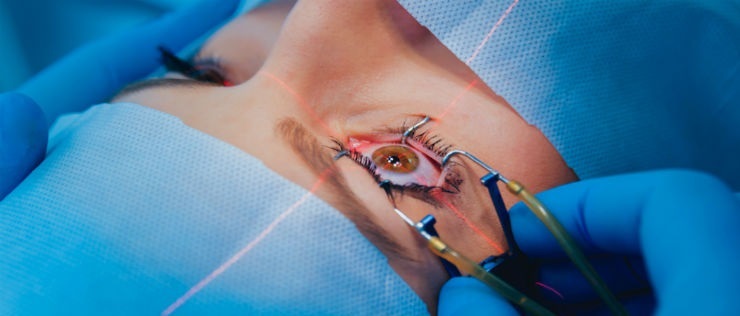Cataract surgery is a routine procedure during which a foggy and blurred lens is removed from the affected eye and replaced with an artificial lens. Although cataract surgery is very common, it can still be scary for some.
The best thing to do in the face of an unknown and frightening procedure is to get some helpful information. We’re here to give you our top five tips to know before you go in for your cataract surgery.
1. Cataracts Form Naturally With Aging
 The first thing to realize about cataracts is that they are quite normal. They occur naturally as we age, and most often they are quite harmless. As they start to cause blurring, early treatments can help greatly, such as stronger prescription glasses.
The first thing to realize about cataracts is that they are quite normal. They occur naturally as we age, and most often they are quite harmless. As they start to cause blurring, early treatments can help greatly, such as stronger prescription glasses.
It’s only when cataracts start to really interfere with your vision that they become necessary to remove. They aren’t going to become deadly overnight, and most often you’ll know when your cataracts are starting to get worse. You will have plenty of time to plan ahead with your doctor.
2. You May Still Need Glasses After Your Surgery
There are a couple of different types of surgeries and two varieties of lenses you can choose for your procedure. Depending on your choice, your long distance vision will improve but not necessarily your short range vision.
A monofocal lens will generally restore only your long distance vision, whereas a multifocal lens will restore your reading vision as well. Your choice will depend on several factors, like price point, necessity and what your doctor recommends. Regardless of your decision, it’s important to know that cataract surgery is not a magical fix-all, and its primary function is to restore normal eyesight rather than create perfect vision.
3. Cataract Surgery Is Often Covered by Insurance
 The type of lens you choose will also determine how much of your surgery is covered by insurance. Monofocal lenses are usually covered by insurance, whereas multifocal lenses typically are not because of the higher expenses associated with them. Similarly, basic cataract surgery is covered by insurance, whereas newer methods of advanced laser eye surgery usually aren’t.
The type of lens you choose will also determine how much of your surgery is covered by insurance. Monofocal lenses are usually covered by insurance, whereas multifocal lenses typically are not because of the higher expenses associated with them. Similarly, basic cataract surgery is covered by insurance, whereas newer methods of advanced laser eye surgery usually aren’t.
Out of pocket expenses for cataract surgery typically range from $1000 to $3000 per eye depending on the exact procedure. Obviously, it can be costly without insurance. Therefore, if pricing is an issue for you, make sure to factor the qualifications for insurance coverage into your planning process.
4. The Recovery Process Is Usually Smooth
Initial recovery following the surgery takes about an hour in the recovery room as the anesthesia wears off. Once you’re home, the most important thing to do is to prevent infection. Avoid getting water in your eye, and be sure to use eye drops to constantly lubricate the healing eye.
You can do normal activities at home, but be sure to avoid anything strenuous like jogging, because this could dislodge the new lens. It’s completely fine to engage in basic sitting activities like reading and watching TV.
In fact, with your new lens you’ll likely experience color and contrast more vividly, making watching TV more enjoyable than ever! Full recovery shouldn’t take more than 8 weeks, and you’ll be checking in semi-regularly with your surgeon during that time to make sure the process is going along smoothly.
5. Cataract Surgery Has an Amazing Success Rate
Cataract surgery has an incredibly high success rate, and though it may not give you perfect vision, it will almost certainly correct your blurry eyesight. You’ll have many doctors to choose from, and many options to make the surgery comfortable for you. The prognosis for long-term recovery from cataract surgery is quite high. The lens implants are permanent and usually last your whole life.
It’s rare to need further surgery after cataract removal. But don’t worry. Any secondary surgery typically would be many, many years later, and if your vision does become affected again, it can usually be fixed by laser surgery rather than another lens replacement.
Final Word
Don’t be afraid of cataract surgery. It will almost certainly fix your vision problems and hopefully give you a lifetime of improved eyesight. It’s a low-risk procedure, and the tips we’ve outlined in this article should help you get started. Good luck!
